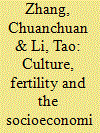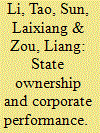| Srl | Item |
| 1 |
ID:
156471


|
|
|
|
|
| Summary/Abstract |
This paper aims to study the effect of culture on economic outcomes by focusing on one unique fertility norm in China: the belief of continuing the family line. Using the national representative household survey data, we successively examine the fertility behavior and socioeconomic status of women in regions of China with varying beliefs regarding continuing the family line. We show that this local fertility norm has positive and significant effects on the fertility behavior, including the number of births; sex selection biased towards boys; and the education, employment status, and income of women. We also show that the gender gaps in education, labor supply, and income are significantly larger in regions where the belief of continuing the family line is stronger. Our results are robust to the control for reverse causality issue by measuring the local fertility norm using the beliefs of the older generation.
|
|
|
|
|
|
|
|
|
|
|
|
|
|
|
|
| 2 |
ID:
174127


|
|
|
|
|
| Summary/Abstract |
Using a novel statistical method, we estimate the vote counts of the secret elections held by the National Congress of the Chinese Communist Party from 1945 to 2017. We also construct a metric for voter preference diversity based on a standard index of legislative party fractionalization. We find that both the number of dissenting votes and the voter preference diversity index plummeted to the bottom in 2017, which is an unprecedented phenomenon in the party's history. Applying the same method to provincial party congress elections from 2006–2017, we find that provincial dissenting votes also declined around the same time, though the magnitude is relatively smaller and there is a wide range of provincial variations. We suggest that President Xi's suppression of formal party institutions is complete at the national level but not yet at the provincial level.
|
|
|
|
|
|
|
|
|
|
|
|
|
|
|
|
| 3 |
ID:
092538


|
|
|
|
|
| Publication |
2009.
|
| Summary/Abstract |
This study assesses the impact of government shareholding on corporate performance using a sample of 643 non-financial companies listed on the Chinese stock exchanges. In view of the controversial empirical findings in the literature and the limitations of the least squares regressions, we adopt the method of quantile regression and report a robust and significant negative relation between government shareholding and corporate performance among, and only among, the more profitable firms. This new finding, which the conditional mean-focused regressions do not capture, suggests that while Chinese government still exerts influences on the performance of these partially privatized firms, the relationship parameter changes across quantiles of the distribution of performance variables.
|
|
|
|
|
|
|
|
|
|
|
|
|
|
|
|
| 4 |
ID:
093841


|
|
|
|
|
| Publication |
2010.
|
| Summary/Abstract |
Using the 2005 placement data from two separate colleges, this paper studies graduate job allocation in China after higher education reform. Other things being equal, graduates with better college GPA were more likely to be employed (in particular by high-pay foreign firms) in both colleges. Female advantage in GPA helped to produce a surprising gender employment gap favoring female graduates. Our empirical evidence does not support the three alternative hypotheses of such a gap. Even though the job-market returns to GPA might be higher for women, there is some weak evidence that the job-market preferred male graduates over their female peers with similar qualifications. Pre-college urban hukou status and a proxy of father's education had positive impacts on a graduate's educational and employment outcomes. There is no evidence that father's Communist Party membership mattered.
|
|
|
|
|
|
|
|
|
|
|
|
|
|
|
|